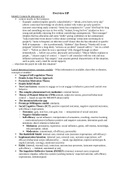Overview HP
Identify Context & relevance of it
context mostly in first sentence
◦ Example: student (implies specific values/beliefs) + “drinks a few beers every day”
(shows contextual knowledge on alcohol); student who wakes up early (positive
outcome concerning study context); “Jenny has complains for 7 years” (feel bad for long
time and something not easy to live with); “student, living his live” (student so he is
young and probably enjoying live without considering consequences); “floor manager”
(implies that has education and some “skills” giving confidence in her estimations);
“Julia reads letter from doctor’s office about screening” (what does screening do to
people?); “nurse in hospital, on infection ward” (know that she has education in specific
field of symptoms → she is professional); “diabetes” (has illness); “Wonka still is not
pregnant” (tried for a long time); “serious car accident” (caused suffer) + “sits in a wheel
chair” + “before accident he was a sportsman” (life changed through accident
tremendously → before was active, physically and socially) “Mayor Mesby explains to
people...” (mayor aspect of context → mayor’s call consistent with her role and may
influence persuasion); “hip surgery” (can assume general characteristics of the situation,
such as pain, worry, need for social support)
→ what does the psych do with this situation?
List of theoretical terms, concepts, models – What information is available, that refers to theories,
concepts or models?
Temporal Self-regulation Theory
Health Action Process Approach
Protection Motivation Theory
Health Belief Model
Two Core factors: reasons to engage or to not engage in behavior; perceived control over
behavior
The complex phenomena/Core mediatiors: external factors
Theory of Planned Behavior (TPB):attitude, subjective norms, perceived behavioral
control → based on specific BELIEFS about reality
The intention-behavior gap
Prototype/Willingness model: similarity
Social Cognitive Theory (SCT): positive expected outcomes, negative expected outcomes,
self-efficacy expectations
◦ Outcomes: gain, non-loss, non-gain, loss → interpretation of actual outcome
◦ Negative Reinforcement
◦ Self-efficacy: social influence, interpretation of sensations, coaching, enactive learning
→ motivational power (influence positive and negative outcomes; determine goals and
intentions; direct relation to behavior)
▪ Mediation: personality, experience, social influence, genes, self-esteem, knowledge,
risk perception, values
▪ Moderators: commitment, elf-efficacy, personality
The Battlefield Model: internal cues, external cues (outcome expectations, self-efficacy)
Implementation Intention: (internal cues, external cues; outcome expectations, self
efficacy) behavioral script; influenced by … mood, ego-depletion, implicit stereotypes &
implicit attitude, cravings, emotional reactivity
Habit: (internal, external cue), conscious, unconscious processes, (outcome expectations,
self-efficacy → habitual, automated or not)
The Impulsive-Reflective System (IM/REF): (internal, external cues), (expected
outcomes), impulse, reflective-system (working memory: expected outcome, self-efficacy
expectations, intention/goal)
, COVID 19
Self-evaluation emotions: value, mental representation, value violation, negative self-
evaluative emotions/outcome expectations
Self-affirmation theory: maintain view of self as adaptive, adequate or coherent
Social Cognitive Stage Model:
Trans Theoretical Model (TTM): pro, cons (both attitudinal factor), self-efficacy (control
factor), 10 process of change (experiential processes, behavioral processes)
◦ stages of change: precontemplation, contemplation, preparation, action, maintenance
▪ Personal Choice Model: initiation, establishment, maintenance, contemplation of
change, decision to change, short-term change, long-term change
▪ Model of Unplanned Smoking Initiation in Children and Adolescents: innovative
smoker, contemplating experimenter
▪ Persuasion-Communication Model: attention, comprehension, attitude, social
support, self-efficacy, behavior change, maintenance
▪ The Conflict Theory of Decision Making → based on questions
▪ The Precaution Adoption Process: unaware, aware problem for others, aware
problem for you (all 3 stages with regard to susceptibility + effectiveness of
precaution), decides to act, take precaution
▪ Model of Five Stages in the Innovation-Decision Process: knowledge, persuasion,
decision, implementing, confirmation
▪ The I-Change Model: awareness, motivation,(information factors/preceding
factors), action, behavior
▪ Health Action Process Approach: pre-intentional motivation processes (perceived
self-efficacy, outcome expectanies, risk perception → intention), post-intentional
volition processes (planning → initiative, maintenance, recovery) →
action/disengagement
◦ System Theory: human seen as system
◦ The Dynamic System: group of related and organized elements, self-organization,
attractor
◦ The Human System: system with subsystems
◦ System Theoretical Perspective: stable state, unstable state, attractors, relapse
▪ 3 psychological processes: motivational process (defensive self-regulation, social
comparison, working memory); planning process (goal setting, mental simulation,
implementation Intention); Learning process (interpreting, learning, progress
feedback)
◦ Self-Regulation: goal attainment behavior ← monitoring → conflicting goals/barrier,
self-control behavior, working memory, executive control
Common Sense Model: cognitive representation, affective reactions, contextual factors
Illness Representation: symptom labels, causal attributions, perceived consequences,
temporal expectations, symptom management beliefs; if-then plans
Symptom Perception: aware of psychological processes through senses (seeing, hear,
smell, touching, tasting, proprioceiving, symptom perceiving, measuring),
monitoring/attention to body (beliefs, heuristics), decision making, psychological experience
(emotions), behavior
◦ illness beliefs
◦ medicine beliefs
▪ Control theory: input, value & goals (conflicting goals → defensive down
regulation), comparator, adjust output (uncertainty →search for signals; evt
uncertainty remains), change consequences
▪ Asymptomatic condition: no symptoms, (mistakenly) attribute symptoms to disease
▪ Symptomatic disease: (mistakenly) attribute symptoms




